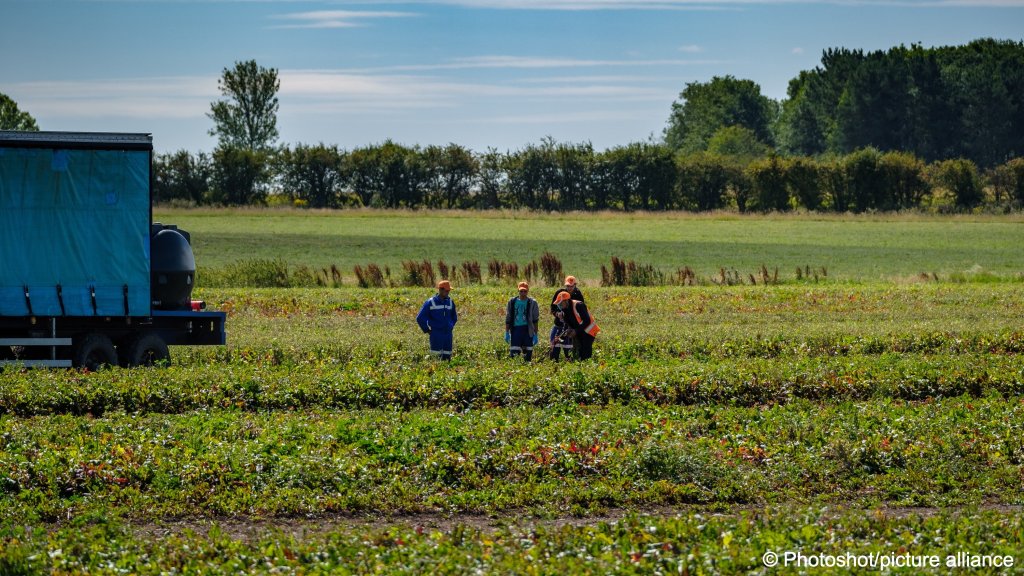Agricultural and care workers reported incidents of debt bondage and being misled about the conditions attached to their visa to UK researchers. Immigration fears prevented many from reporting exploitation to authorities, they said.
Research conducted by a coalition of UK universities and charities suggests that visa policies meant to curb labor shortages as a result of Brexit have put workers at a higher risk for exploitation.
Since the United Kingdom’s exit from the European Union, time-bound visas with stringent conditions have been made available to farm workers and care workers. The conditions attached to these visas put workers in a position of "hyper-precarity", the authors found.
The report, led by Inga Thiemann at the University of Leicester, was conducted by five academics and four NGOs: Focus on Labour Exploitation, Joint Council for the Welfare of Immigrants, Southeast and East Asian Centre and Kanlungan Filipino Consortium.
It was funded by the UK's Modern Slavery and Human Rights Policy and Evidence Centre.
Workers employed in the agricultural and care sectors allegedly faced conditions of debt bondage because of compounded costs resulting from illegal recruitment fees, costs incurred for travel and training as well as wage deductions. Workers also reported having been misled about the conditions that come with their visa and the length of employment.
In addition, the research stated that fear of immigration enforcement hindered many from reporting incidents of exploitation to the authorities for appropriate action.
"The welfare of visa holders is of paramount importance and we are clamping down on poor working conditions and exploitation," the UK Home Office told InfoMigrants in statements responding to the allegations.

Shifting recruitment sectors
Under the freedom of movement rules that govern the European Union, citizens from EU countries had the right to live and work in the UK without permission. After Brexit, free movement ended. EU citizens wanting to live or work in the UK became subject to more restrictive immigration rules. This prompted the UK to expand worker recruitment to other non-EU countries.
Mariko Hayashi, executive director of Southeast and East Asian Centre (SEEAC), a London-based migrant rights group that participated in the research study, told InfoMigrants that in addition to Brexit, other world developments such as the war in Ukraine have shrunk the UK’s usual pool of seasonal workers.
"Now, recruitment sectors have shifted to countries in Asia," said Hayashi.
"People looking for work in sectors like agriculture or home care are often low-paid workers. They don't have a lot of options. So they only choose destinations from what is available. After Brexit, that became the UK."
The expansion of recruitment in Asian countries also meant these workers were the first to "try out" the new visa regimes.
"For a lot of Eastern Europeans, for example, seasonal work was a summer job option for so many years. But these workers from Asia don't have the people who have been there before to ask. They're the first people (under this visa regime). They have no points of reference," Hayashi said.
Read more: UK government complicit in exploitation of farm workers – Bureau of Investigative Journalism
Know where to get help before you need it
Hayashi advises migrants who want to work in the UK to know where to get help before they need it.
She recommended that migrants should try to verify information they find about work opportunities by checking work regulations on the internet and other reliable forums.
Additionally, she said, they should have a list of emergency numbers to call in case they need help.
The groups and organizations on this list should include the migrant worker's embassy and its location, migrant worker organizations in their home country that have networks in different parts of the world and organizations in their host country that work in the sector they are employed in.
"The kind of work visa you're on, the sector you work in, or whether or not you're documented will also determine which groups you can go to and help filter the search," Hayashi concluded.
'Inadequate' control measures
The government introduced its Seasonal Worker visa (SWV) in 2019. It allows guest laborers to enter the UK for stints lasting less than six months. Last year, some 45,000 visas were earmarked for agricultural workers.
In 2021, the government introduced a Skilled Health & Care Worker visa to further plug workforce gaps. Under this visa, applicants pay lower visa application fees and do not have to pay a fee for their healthcare. In contrast to visas given to seasonal agricultural workers, skilled health and care workers can renew their visas and have a route to settlement.
In 2022, care workers were added to the UK's Shortage Occupation List. Data from Skills for Care, the planning body for adult social care in England, shows that there are an estimated 160,000 job posts in the adult social care sector that need to be filled.
However, the freedom to transfer to a new employer is restricted. Workers under the Skilled Health & Care Worker visa must secure another employer within 60 days and file a new visa application.
Read more: Quiet exploitation: Foreign health and care workers in the UK forced into silence for visas
According to a report on immigration in the care sector published by David Neal, former chief inspector of borders and immigration, with its introduction of these programs, the Home Office applied a visa model based on one for highly skilled workers sponsored by multinationals to a poorly paid migrant worker sector that is already prone to exploitation.

The seasonal worker visa was reportedly rolled out before the pilot of the plan was reviewed. The report also noted that the Home Office continued to expand the scheme despite strong evidence of worker exploitation.
The report further outlined recommendations, such as conducting a thorough review of the Skilled Worker route using lessons from past assessments of the visa policy, creating a comprehensive and accessible guide detailing employment rights for migrants and creating adequate support and reporting systems for migrants seeking help and advice.
In response to Neal's report, a Home Office spokesperson told InfoMigrants: “To address concerns about abuse within the health and care worker sector, providers in England are now only able to sponsor migrant workers if they are undertaking activities regulated by the Care Quality Commission."
"The seasonal workers route has been running for four years and each year improvements have been made to stop exploitation and clamp down on poor working conditions while people are in the UK," the Office said in statements sent via email.
